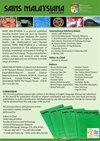Seed Germination Characteristics as Affected by Interaction of Moisture Stress and Temperature in Sethoxydim-Resistant Biotype of Goosegrass (Eleusine indica (L.) Gaertn.) from Malaysia
IF 0.7
4区 综合性期刊
Q3 MULTIDISCIPLINARY SCIENCES
引用次数: 0
Abstract
Understanding temperature and moisture stress that influence sethoxydim-resistant (R) goosegrass (Eleusine indica) germination is crucial for effective weed control, but little research has been done on the impact of these environmental factors on germination of the R goosegrass biotype. This research aims to confirm sethoxydim resistance in goosegrass and to examine interaction effects of different temperatures and water potentials on germination of the R goosegrass biotype. Dose–response tests showed that the R goosegrass biotype exhibited high resistance level to sethoxydim with 17-fold. In laboratory bioassays, the R goosegrass biotype germinated by 88-100% at 35 °C with water potentials ranging from 0 to -0.80 MPa, but no seed germination occurred at 10 °C and 40 °C under all water potential treatments. With rising water potentials from 0 to -0.80 MPa, seed germination at 15 to 30 °C decreased markedly. The time it took to achieve 50% seed germination (T 50) increased drastically when decreasing temperature from 35 to 15 °C. The T50 at 20 to 30 °C also increased as the water potential increased from -0.20 to -0.80 MPa. At 35 °C, however, the water potential level had no impact on T 50, implying that the R goosegrass biotype seed is water stress tolerant at 35 °C. The base temperature and base water potentials estimated were 10.6 °C and -1.28 MPa, respectively. These findings can help in determining the optimal time to apply pre-emergent and early post-emergent controls when a large proportion of R goosegrass biotype have already germinated or emerged.湿度和温度对抗乙醛生物型鹅草种子萌发特性的影响来自马来西亚的Gaertn
了解温度和水分胁迫对耐乙氧基(sethoxydium -resistant, R)鹅毛草(Eleusine indica)萌发的影响是有效防治鹅毛草杂草的关键,但这些环境因素对鹅毛草生物型萌发的影响研究甚少。本研究旨在证实鹅草对乙氧霉素的抗性,并研究不同温度和水势对R型鹅草萌发的交互作用。剂量效应试验表明,R型鹅草对乙氧基醚具有17倍的高抗性。在实验室生物测定中,R型鹅草在35℃、水势为0 ~ -0.80 MPa条件下的萌发率为88% ~ 100%,但在10℃和40℃条件下,所有水势处理均未萌发。随着水势从0 ~ -0.80 MPa的升高,种子在15 ~ 30℃的萌发率显著降低。当温度从35°C降低到15°C时,达到50%种子发芽所需的时间(t50)急剧增加。随着水势从-0.20 MPa增加到-0.80 MPa, 20 ~ 30℃时的T50也随之增加。在35℃条件下,水势水平对t50没有影响,说明R型鹅草种子在35℃条件下具有耐水胁迫能力。碱基温度和碱基水势分别为10.6℃和-1.28 MPa。这些发现有助于确定当大部分R型鹅草已经发芽或出现时,应用发芽前和发芽后早期控制的最佳时间。
本文章由计算机程序翻译,如有差异,请以英文原文为准。
求助全文
约1分钟内获得全文
求助全文
来源期刊

Sains Malaysiana
MULTIDISCIPLINARY SCIENCES-
CiteScore
1.60
自引率
12.50%
发文量
196
审稿时长
3-6 weeks
期刊介绍:
Sains Malaysiana is a refereed journal committed to the advancement of scholarly knowledge and research findings of the several branches of science and technology. It contains articles on Earth Sciences, Health Sciences, Life Sciences, Mathematical Sciences and Physical Sciences. The journal publishes articles, reviews, and research notes whose content and approach are of interest to a wide range of scholars. Sains Malaysiana is published by the UKM Press an its autonomous Editorial Board are drawn from the Faculty of Science and Technology, Universiti Kebangsaan Malaysia. In addition, distinguished scholars from local and foreign universities are appointed to serve as advisory board members and referees.
 求助内容:
求助内容: 应助结果提醒方式:
应助结果提醒方式:


